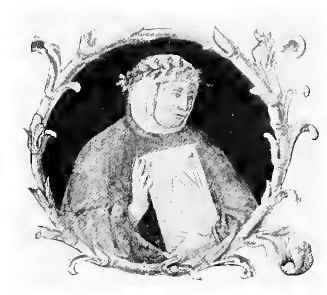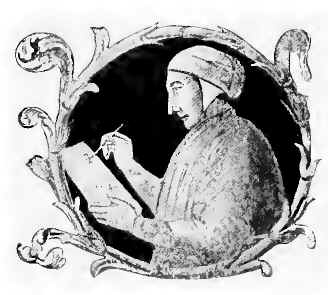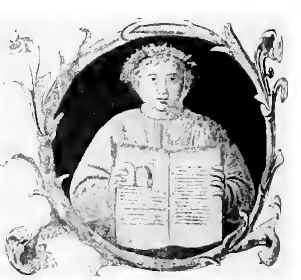 полная версия
полная версияThe Thirteenth, Greatest of Centuries

PETRARCA OMNIUM VIRTUTUM
MONARCA

GIOTTO, PICTOR EXIMIUS

DANTE THEOLOGUS NULLIUS
DOGMATIS EXPERS
It will be said by those who do not appreciate the conditions that existed in the Middle Ages, that these numbers at the universities seeking the higher education, mean very little for the culture of the people, since practically all of those in attendance at the universities belonged to the clerical order. There is no doubt that most students were clerics in the Thirteenth Century. This did not mean, however, that they had taken major orders or had in any way bound themselves irrevocably to continue in the clerical vocation. The most surprising thing about the spread of culture and the desire for the higher education during the Thirteenth Century, is that they developed in spite of the fact that the rulers of the time were all during the century, embroiled in war either with their neighbors or with the nobility. Anyone who wanted to live a quiet, intellectual life turned naturally to the clerical state, which enabled him to escape military duties and gave him opportunities for study, as well as protection from many exactions that might otherwise be levied upon him. The church not only encouraged education, but supplied the peaceful asylums in which it might be cultivated to the heart's content of the student.
While this clerical state was a necessity during the whole time of residence at the university, it was not necessarily maintained afterward. Many of the clerics did not even have minor orders—orders which it is well understood carry with them no absolute obligation of continuing in the clerical state. Sextons and their assistants were clerics. When the word canon originally came into use it meant nothing more than that the man was entered on the rolls of a church and received some form of wages therefrom. Students at the universities were by ecclesiastical courtesy then, clerics (from which comes the word clerk, one who can read and write) though not in orders, and it was because of this that the university was able to maintain the rights of students. It was well understood that after graduation men might take up the secular life and indeed most of them did. In succeeding chapters we shall see examples of this and discuss the question further. Professors at the universities had to maintain their clerical condition so that even professors of law and of medicine were not allowed to marry. This law continued long beyond the Thirteenth Century, however. Professors of medicine were the first to be freed from the obligation of celibacy, but not until the middle of the Fifteenth Century at Paris, while other professors were bound thus for a full century later. Certain minor teaching positions at Oxford are still under this law, which evidently has seemed to have some advantage or it would not have been maintained.
It might perhaps be thought that only the wealthier class, the sons of the nobility and of the wealthy merchants of the cities had opportunities at the universities. As a matter of fact, however, the vast majority of the students was drawn from the great middle class. The nobility were nearly always too occupied with their pleasures and their martial duties to have time for the higher education. The tradition that a nobleman should be an educated gentleman had not yet come in. Indeed many of the nobility during the Thirteenth Century rather prided themselves on the fact that they not only had no higher education, but that they did not know even how to read and write. When we reflect, then, on the large numbers who went to the universities, it adds to our surprise to realize that they were drawn from the burgher class. It is evident that many of the sons even of the poor were afforded opportunities in different ways at the universities of the time.
Tradition shows that from the earliest time there were foundations on which poor students could live, and various arrangements were made by which, aside from these, they might make their living while continuing their studies. Working one's way through the university was more common in the Thirteenth Century than it is at the present day, though we are proud of the large numbers who now succeed in the double task of supporting and educating themselves, with excellent success in both enterprises. There are many stories of poor students who found themselves about to be obliged to give up their studies, encountering patrons of various kinds who enabled them to go on with their education.
There is a very pretty set of legends with regard to St. Edmund of Canterbury in this matter. He bears this name because he was afterward the sainted primate of England. For many years he taught at the University of Oxford. The story is told of a clerical friend sending him up a student to Oxford and asking that his bills be sent to him. St. Edmund's answer was that he would not be robbed of an opportunity of doing good like this, and he took upon himself the burden of caring for the student. At the time there were many others dependent on his bounty and his reputation was such that he was enabled to help a great many through the benefactions of friends, who found no higher pleasure in life than being able to come generously to Edmund's assistance in his charities.
Those who know the difficulty of managing very large bodies of students will wonder inevitably, how the medieval universities, with their less formal and less complete organizations, succeeded in maintaining discipline for all these thousands of students. Most people will remember at once all the stories of roughness, of horse play, of drinking and gaming or worse that they have heard of the medieval students and will be apt to conclude that they are not to be wondered at after all, since it must have been practically impossible for the faculties of universities to keep order among such vast numbers. As a matter of fact, however, the story of the origin and maintenance of discipline in these universities is one of the most interesting features of university life. The process of discipline became in itself a very precious part of education, as it should be of course in any well regulated institution of learning. The very fact, moreover, that in spite of these large numbers and other factors that we shall call attention to in a moment, comparatively so few disgraceful stories of university life have come down to us, and the other and still more important fact that the universities could be kept so constantly at the attainment of their great purpose for such numbers, is itself a magnificent tribute to those who succeeded in doing it, and to the system which was gradually evolved, not by the faculty alone but by teachers and students for university government.
With regard to the discipline of the medieval universities not much is known and considerable of what has been written on this obscure subject wears an unfavorable tinge, because it is unfortunately true that "the good men do is oft interred with their bones" while the evil has an immortality all its own. The student escapades of the universities, the quarrels between town and gown, the stories of the evils apparently inevitable, where many young men are congregated—the hazing, the rough horse play, the carousing, the immoralities—have all come down to us, while it is easy to miss the supreme significance of the enthusiasm for learning that in these difficult times gathered so many students together from distant parts of the world, when traveling was so difficult and dangerous, and kept them at the universities for long years in spite of the hardships and inconveniences of the life. With regard to our modern universities the same thing is true, and the outside world knows much more of the escapades of the few, the little scandals of college life, that scarcely make a ripple but are so easily exaggerated, and so frequently repeated and lose nothing by repetition, the waste of time in athletics, in gambling, in social things, than of the earnest work and the successful intellectual progress and interests of the many. This should be quite enough to make the modern university man very slow to accept the supposed pictures of medieval student life, which are founded mainly on the worse side of it. Goodness is proverbially uninteresting, a happy people has no history and the ordinary life of the university student needs a patient sympathetic chronicler; and such the medieval universities have not found as yet. But they do not need many allowances, if it will only be remembered under what discouragements they labored and how much they accomplished.
The reputation of the medieval universities has suffered from this very human tendency to be interested in what is evil and to neglect the good. Even as it is, however, a good deal with regard to the discipline of the universities in the early times is known and does not lose in interest from the fact, that the main factor in it was a committee of the students themselves working in conjunction with the faculty, and thus anticipating what is most modern in the development of the disciplinary regime of our up-to-date universities. At first apparently, in the schools from which the universities originated there was no thought of the necessity for discipline. The desire for education was considered to be sufficient to keep men occupied in such a way that further discipline would not be necessary. It can readily be understood that the crowds that flocked to hear Abelard in Paris, and who were sufficiently interested to follow him out to the Desert of the Paraclete when he was no longer allowed to continue his lectures in connection with the school at Paris, would have quite enough of ruling from the internal forum of their supreme interest, not to need any discipline in the external forum.
In the course of time, however, with the coming of even greater numbers to the University of Paris, and especially when the attendance ran up into many thousands, some form of school discipline became an absolute necessity. This developed of itself and in a very practical way. The masters seem to have had very little to do with it at the beginning since they occupied themselves entirely with their teaching and preparation for lectures. What was to become later one of the principal instruments of discipline was at first scarcely more than a social organization among the students. Those who came from different countries were naturally attracted to one another, and were more ready to help each other. When students first came they were welcomed by their compatriots who took care to keep them from being imposed upon, enabled them to secure suitable quarters and introduced them to university customs generally, so that they might be able to take advantage, as soon as possible, of the educational opportunities.
The friendships thus fostered gradually grew into formal organizations, the so-called "nations." These began to take form just before the beginning of the Thirteenth Century. They made it their duty to find lodgings for their student compatriots, and evidently also to supply food on some cooperative plan for at least the poorer students. Whenever students of a particular nationality were injured in any way, their "nation" as a formal organization took up their cause and maintained their rights, even to the extent of an appeal to formal process of law before the magistrates, if necessary. The nations were organized before the faculties in the universities were formally recognized as independent divisions of the institution, and they acted as intermediaries between the university head and the students, making themselves responsible for discipline to no slight degree. At the beginning of the Thirteenth Century in Paris all the students belonged to one or other of four nations, the Picard, the Norman, the French, which embraced Italians, Spaniards, Greeks and Orientals, and the English which embraced the English, Irish, Germans, Poles (heterogeneous collection we would consider it in these modern days) and in addition all other students from the North of Europe.
Professor Laurie, of the University of Edinburgh, in his Rise and Early Constitution of Universities in the International Educational Series8 says:
"The subdivisions of the nations were determined by the localities from which the students and masters came. Each subdivision elected its own dean and kept its own matriculation-book and money-chest. The whole "nation" was represented, it is true, by the elected procurators; but the deans of the subdivisions were regarded as important officials, and were frequently, if not always, assessors of the procurators. The procurators, four in number, were elected, not by the students as in Bologna and Padua, but by the students and masters. Each nation with its procurator and deans was an independent body, passing its own statutes and rules, and exercising supervision over the lodging-houses of the students. They had each a seal as distinguished from the university seal, and each procurator stood to his "nation" in the same relation as the Rector did to the whole university. The Rector, again, was elected by the procurators, who sat as his assessors, and together they constituted the governing body; but this for purposes of discipline, protection and defense of privileges chiefly, the consortium magistrorum regulating the schools. But so independent were the nations that the question whether each had power to make statutes that overrode those of the universitas, was still a question so late as the beginning of the Seventeenth Century."
It is typical of the times that the governing system should thus have grown up of itself and from amongst the students, rather than that it should have been organized by the teachers and imposed upon the university. The nations represented the rise of that democratic spirit, which was to make itself felt in the claims for the recognition of rights for all the people in most of the countries during the Thirteenth Century, and undoubtedly the character of the government of the student body at the universities fostered this spirit and is therefore to a noteworthy degree, responsible for the advances in the direction of liberty which are chronicled during this great century. This was a form of unconscious education but none the less significant for that, and eminently practical in its results. At this time in Europe there was no place where the members of the community who flocked in largest numbers to the universities, the sons of the middle classes, could have any opportunities to share in government or learn the precious lessons of such participation, except at the universities. There gradually came an effort on the part of the faculties to lessen many of the rights of the nations of the universities, but the very struggle to maintain these on the part of the student body, was of itself a precious training against the usurpation of privileges that was to be of great service later in the larger arena of national politics, and the effects of which can be noted in every country in Europe, nowhere more than in England, where the development of law and liberty was to give rise to a supreme heritage of democratic jurisprudence for the English speaking peoples of all succeeding generations.
V
POST-GRADUATE WORK AT THE UNIVERSITIES
In modern times it has often been said that no university can be considered to be doing its proper work unless, besides teaching, it is also adding to the existing body of knowledge by original research. Because of unfortunate educational traditions, probably the last thing in the world that would enter into the minds of most people to conceive as likely to be found in the history of the universities of the Thirteenth Century, would be original research in any form. In spite of this almost universal false impression, original work of the most valuable kind, for much of which workers would be considered as amply deserving of their doctorates in the various faculties of the post-graduate departments of the most up-to-date of modern universities, was constantly being accomplished during this wonderful century. It is, as a matter of fact, with this phase of university activity that the modern educator is sure to have more sympathy than with any other, once the significant details of the work become clear.
All surprise that surpassing original work was accomplished will cease when it is recalled that, besides creating the universities themselves, this century gave us the great Cathedrals—a well-spring of originality, and a literature in every civilized country of Europe that has been an inspiration to many subsequent generations. At last men had the time to devote to the things of the mind. During what are called the Dark Ages, a term that must ever be used with the realization that there are many bright points of light in them, men had been occupied with wars and civic and political dissensions of all kinds, and had been gradually climbing back to the heights of interest in intellectual matters which had been theirs before the invasion of the barbarians and the migration of nations. With the rebirth of intellectual interests there came an intense curiosity to know everything and to investigate every manifestation. Everything that men touched was novel, and the wonderful advances they made can only be realized from actual consultation of their works, while the reader puts himself as far as possible at the same mental point of view from which they surveyed the world and their relations to it.
The modern university prides itself on the number of volumes written by its professors and makes it a special feature of its announcements to call attention to its at least supposed additions to knowledge in this mode. It must have been immensely more difficult to preserve the writings of the professors of the medieval universities for they had to be copied out laboriously by hand, yet we have an enormous number of large volumes of their works, on nearly every intellectual topic, that have been carefully preserved. There are some twenty closely printed large folio volumes of the writings of Albertus Magnus that have come down to us. For two centuries, until the time of printing, ardent students must have been satisfied to spend much time in preserving these. While mainly devoted to theology, they treat of nearly everything else, and at least one of the folio volumes is taken up almost exclusively with physical science. St. Thomas Aquinas has as many volumes to his credit and his work is even of more importance. Duns Scotus died at a very early age, scarcely more than forty, yet his writings are voluminously extensive and have been carefully preserved, for few men had as enthusiastic students as he. Alas! that his name should be preserved for most people only in the familiar satiric appellation 'dunce.' The modern educator will most rejoice at the fact that the students of the time must have indeed been devoted to their masters to set themselves to the task of copying out their work so faithfully for, as Cardinal Newman has pointed out, it is the personal influence of the master, rather than the greatness of the institution, that makes education effective.
First with regard to philosophy, the mistress of all studies, whose throne has been shaken but not shattered in these ultimate times. After all it must not be forgotten that this was the great century of the development of scholastic philosophy. While this scholastic philosophy is supposed by many students of modern philosophy to be a thing of the past, it still continues to be the basis of the philosophical teaching in the Catholic seminaries and universities throughout the world. Catholic philosophers are well known as conservative thinkers and writers, and yet are perfectly free to confess that they consider themselves the nearer to truth the nearer they are to the great scholastic thinkers of the Thirteenth Century. Even in the circle of students of philosophy who are outside the influence of scholasticism, there is no doubt that in recent years an opinion much more favorable to the Schoolmen has gradually arisen. This has been due to a study of scholastic sources. Only those despise and talk slightingly of scholasticism who either do not know it at all or know it only at second hand. With regard to the system of thought, as such, ever is it true, that the more close the acquaintanceship the more respect there is for it.
With regard to theology the case is even stronger than with regard to philosophy. Practically all of the great authorities in theology belong to the Thirteenth Century. It is true that men like Saint Anselm lived before this time and were leaders in the great movement that culminated in our century. Saint Anselm's book, Cur Deus Homo, is indeed one of the best examples of the combination of scholastic philosophy and theology that could well be cited. It is a triumph of logical reasoning, applied to religious belief. Besides, it is a great classic and any one who can read it unmoved by admiration for the thinker who, so many centuries ago, could so trenchantly lay down his thesis and develop it, must be lacking in some of the qualities of human admiration. The writers of the Thirteenth Century in theology are beyond even Anselm in their marvelous powers of systematizing thought. One need only mention such names as Albertus Magnus, Thomas Aquinas, Bonaventure. Duns Scotus, and Raymond Lully to make those who are at all acquainted with the history of the time realize, that this is not an idle expression of the enthusiasm of a special votary of the Thirteenth Century.
As we shall see in discussing the career of Saint Thomas Aquinas, the Catholic Church still continues to teach scholastic theology on exactly the same lines as were laid down by this great doctor of the church in his teaching at the University of Paris. Amid the crumbling of many Christian systems of thought, as upheld by the various protestant sects, there has been a very general realization that the Catholic Church has built up the only edifice of Christian apologetics, which will stand the storms of time and the development of human knowledge. Confessedly this edifice is founded on Thirteenth Century scholasticism. Pope Leo XIII., than whom, even in the estimation of those who are least sympathetic toward his high office, there was no man of more supremely practical intelligence in our generation, insisted that St. Thomas Aquinas must in general principle at least, be the groundwork of the teaching of philosophy and theology as they are to form the minds of future Catholic apologists.
The scholastic theology and philosophy of the Thirteenth Century have come to us in absolute purity. The huge tomes which represent the indefatigable labors of these ardent scholars were well preserved by the subsequent generation which thought so much of them, and in spite of the absence of printing have come down to us in perfectly clear texts. It is easy to neglect them and to say that a study of them is not worth while. They represent, however, the post-graduate work and the research in the department of philosophy and theology of these days, and any university of modern time would consider itself honored by having their authors among its professors and alumni. Any one who does not think so need only turn to the volumes themselves and read them with understanding and sympathy, and there will be another convert to the ranks of that growing multitude of scholars, who have learned to appreciate the marvelous works of our university colleagues of the Thirteenth Century.
With regard to law, not much need be said here, since it is well understood that the foundations of our modern jurisprudence (see chapters on Legal Origins), as well as the methods of teaching law, were laid in the Thirteenth Century and the universities were the most active factors, direct and indirect, in this work. The University of Bologna developed from a law school. Toward the end of the Twelfth Century Irnerius revived the study of the old Roman law and put the curriculum of modern Civil Law on a firm basis. A little later Gratian made his famous collection of decretals, which are the basis of Canon Law. Great popes, during the Thirteenth Century, beginning with Innocent III., and continuing through such worthy emulators as Gregory IX. and Boniface VIII., made it the special glory of their pontificates to collect the decrees of their predecessors and arrange and publish them, so that they might be readily available for consultation.











